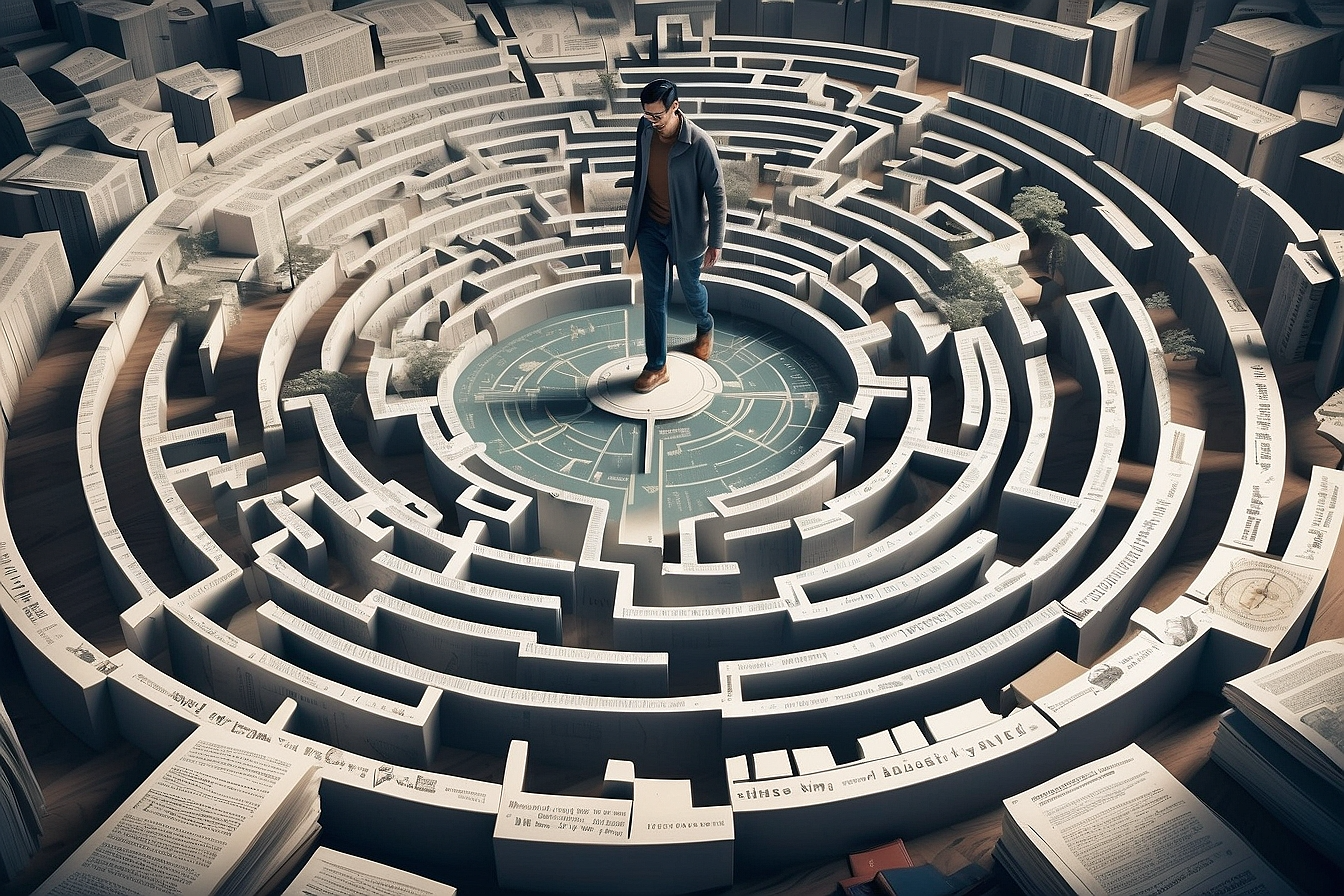Introduction

Have you ever watched in disbelief as someone you’ve admired for their intellect—maybe a mentor, a renowned smart person, or a leader in tackling extremely complex global problems—made a dumb mistake so glaring that you had to rub your eyes and look again? I have. It’s like watching a seasoned marathon runner trip over their shoelaces at the start line. You think, “How could someone so intelligent, adept at problem-solving and navigating life’s maze, stumble over something so basic?”
This question isn’t just idle curiosity. It’s a puzzle that digs into the heart of what we assume about intelligence, success, and the human propensity to do remarkably stupid things occasionally. Intelligence tests and IQ scores rave about our ability to solve algebra or understand Shakespeare, but they miss something crucial—our flexible thinking skills when we confront complex problems.
Imagine, for a moment, a world-renowned expert on dynamic systems, someone who’s spent more than a year developing a sizable force to tackle suddenly turned complex issues. This expert, hailed for their wisdom, makes a critical mistake that sends ripples through their field. It’s not about the small slips we all make daily but about how even the smartest people can falter, leading to poor decisions with far-reaching impacts.
Why does this happen? And why does it matter to us? Whether running businesses, raising families, or trying to get a good night’s sleep, understanding this problem offers a fascinating glimpse into the human condition and practical insights into how we can all make better choices.
As we dive into this exploration, remember: Intelligence is a tool, not an immunity card against the complexities of life. Even those armed with the sharpest minds are not safe from the complex problems of the real world. It’s a humbling reminder that in our quest for achieving success, maintaining a keen awareness of our vulnerabilities is just as important as celebrating our strengths.
Emotional and Personal Motivations

When we talk about emotional and personal motivations, the labyrinth of human behavior twists and turns, driven by the dual engines of seeking validation and pleasure in the murky waters of desire and denial. Here, even the most intelligent people often find themselves adrift, making poor decisions that baffle onlookers.
Seeking Validation and Pleasure
At first glance, the quest for social approval and the pursuit of immediate gratification might seem like behaviors far removed from the calculated, logical processes we associate with smart people. Yet, these emotional drives are deeply human, cutting across lines of intellect and reasoning with startling precision. The pull of a compliment, the rush of a win, the warm glow of being right are not just trifles but powerful forces that can sway the most disciplined minds.
Consider the example of a dynamic systems specialist, renowned for their problem-solving prowess. Yet, they find themselves drawn to a risky scheme when it comes to personal investments. The red flags are there, waving in the wind, yet they press on, seduced by the twin sirens of potential wealth and the acclaim it could bring. This isn’t just about money; it’s about what that money represents—success, validation, the proof in tangible terms that they are not just smart, but successful and admired.
Denial and Self-Justification
But what happens when the path to validation veers off course? Here, denial and self-justification enter the stage, like spin doctors in the mind, ready to twist reality to fit a more emotionally satisfying narrative. Sure, it’s a defense mechanism, but it’s also a trap that ensnares intelligent people into believing their own press, leading to decisions that look more like dumb mistakes in the harsh light of day.
The investor, for example, might start to ignore the warning signs, discounting them as bad luck or extenuating circumstances. They justify their choices, believing that their specialist’s training and success in other areas will protect them from failure. But complex problems in the real world don’t always bow to simple rules or past success. This denial becomes a sizable force, capable of propelling them further into risky territories, often with critical mistakes lurking around the corner.
The root is the same in both seeking validation and engaging in denial. This deeply human, emotional need doesn’t vanish with the accumulation of knowledge or solving complex problems. It’s a reminder that beneath the veneer of achieving success and intelligent decision-making, smart people’s emotional and personal motivations can lead them to do stupid things, not because they lack intelligence but because they, like all of us, are navigating the complicated dance of being human.
Cognitive Biases and Blind Spots
Navigating through life’s decisions, smart people—from scientists tackling extremely complex global problems to CEOs running dynamic systems—aren’t immune to the pitfalls of cognitive biases and blind spots. These mental shortcuts and oversights, deeply embedded in our psychology, play a pivotal role in why intelligent people do dumb things.
Confirmation Bias
At the heart of many a poor decision lies confirmation bias, the brain’s sticky habit of favoring information that cuddles up comfortably with our pre-existing beliefs. This bias doesn’t discriminate based on IQ scores; it’s an equal-opportunity disruptor, skewing the decision-making process of even the most critical minds.
Imagine a scientist, well-versed in problem-solving and used to confronting complex problems with rigorous logic. Yet, when faced with data that challenges their original hypothesis, they falter, letting confirmation bias cloud their judgment. Instead of seeing this contradictory evidence as a crucial piece of the puzzle, they dismiss it, clinging to their initial belief with an almost emotional fervor. It’s not just about being right; it’s about the comfort of not confronting the unknown factors that lie beyond their cognitive science fortress.
Limited Perspectives
Another facet of this puzzle is the trap of limited perspectives. Intelligence, often measured by IQ tests and tests, does little to gauge how well we navigate outside our spheres of expertise. The smartest people, brimming with knowledge in their field, can become trapped in their success, unwittingly wearing blinders that block out crucial interdependent variables.
This limited perspective is vividly illustrated in the case of our scientist, who, despite their ability to easily visualize complex issues within their domain, struggles to incorporate outside knowledge or alternative viewpoints. Their specialist’s training, while invaluable, also acts as a boundary, preventing them from fully appreciating the dynamic systems at play. It’s a stark reminder that solving problems isn’t just about applying formulas or producing results; it’s about understanding the broader context in which these problems exist.
Cognitive biases and blind spots are not mere footnotes in the narrative of intelligent decision-making. They’re significant players, influencing smart people to make dumb things, not out of a lack of knowledge or ability but due to the inherent limitations of human cognition. Recognizing and addressing these biases is crucial for avoiding critical mistakes and fostering a more holistic, flexible approach to problem-solving in our increasingly complex world.
Situational and External Pressures

The intellectual prowess that guides smart people through problem-solving and mastering complex problems doesn’t grant them immunity against situational and external pressures. These pressures can dramatically skew the decision-making process, leading to actions that, in retrospect, seem inexplicably misguided.
Stress and Time Pressure
Under the twin specters of stress and time pressure, the normally steady hand of reason can tremble. The rush for immediate solutions, the crunch of a ticking clock, can push even the most intelligent people towards shortcuts that bypass thoughtful analysis. It’s a human response to the human condition. Still, when smart people fall into this trap, the consequences can echo far beyond the immediate stressor, affecting lives, businesses, and, sometimes, the course of history.
Consider the doctor facing a doctor’s simple problem with a patient’s condition but under severe time constraints. The necessity for quick decision-making can lead to impulsive decisions, where the critical mistakes are not just dumb mistakes but potentially life-altering errors. The pressure to act swiftly often leaves no room for reflection, second-guessing, or considering unknown factors that might radically alter the decision’s effectiveness.
Groupthink
Equally insidious is the phenomenon of groupthink, where the desire for harmony within a group decision-making context suppresses dissenting viewpoints. This pressure to conform can be particularly potent in high-stakes environments like corporate boards, where the stakes are personal and profoundly collective.
An illustrative example is a company board faced with the decision of approving a questionable merger. The dynamic systems of corporate governance and personal ambition interlace, creating a scenario where social pressure silences skepticism. The fear of rocking the boat or being the lone voice of dissent can lead to a unanimous decision that, in hindsight, is fraught with poor decisions and bad luck. Instead of propelling the company forward, the merger becomes a cautionary tale of what happens when intelligent people allow the tide of consensus to override their individual judgment and expertise.
The lesson is clear in both stress-induced shortcuts and the conformity of groupthink: Situational and external pressures can lead smart people to do stupid things. Recognizing these pressures for what they are—a distortion of the decision-making process—is the first step in mitigating their impact, ensuring that the path chosen is not the path of least resistance but the one most aligned with reasoned, critical thinking.
Conclusion
In our journey through the curious landscape of why smart people do stupid things, we’ve traversed the terrains of overconfidence, emotional motivations, cognitive biases, and situational pressures. These explorations reveal not a series of isolated anecdotes but a tapestry of interconnected human experiences that underscore a fundamental truth: intelligence does not equal immunity to error.
The stories of intelligent people making poor decisions—from the scientist ignoring incongruous evidence to the company board succumbing to groupthink—illustrate how surprising an oversight can seem the smarter the mind. Yet, these aren’t just quirks of a few; they reflect universal cognitive traps and human vulnerabilities.
Cognitive science teaches us that our brains, remarkable as they are in solving complex problems and navigating dynamic systems, are also prone to confirmation bias, limited perspectives, and the allure of simple rules in a complex world. Similarly, emotional and personal motivations can cloud our judgment, leading us down paths of denial and self-justification that veer away from rationality.
Situational and external pressures—the crush of time, the weight of social approval, the echo chamber of groupthink—further complicate the landscape, pushing even the most intelligent among us towards decisions that, in hindsight, beg the question, “What were they thinking?”
The answer lies not in dismissing these lapses as mere dumb mistakes but in recognizing them as part of the human condition. It’s a humbling reminder that intelligence tests and IQ scores only measure so much. Feeling smart doesn’t shield us from making mistakes; if anything, it might make those mistakes all the more bewildering.
So, what’s the call to action? It’s simple yet challenging: Practice self-awareness and critical thinking. Recognize that intelligence is a tool, not a talisman against error. Embrace flexible thinking skills, and remember that problem-solving in the real world demands more than precise goals and clear vision; it requires an openness to unknown factors and a willingness to question even our most cherished beliefs.
As we move forward, let’s not shy away from our mistakes but learn from them, using them as stepping stones towards better, more informed decision-making. After all, the true mark of intelligence isn’t in never making mistakes but in how we respond to them, grow from them, and, ultimately, how we allow them to refine, not define, our journeys.

